Larnaca District Court ruling in the case of Irina Krivous by Judge Andreas Luka calls into question the reputation of the Cyprus court as an independent public institution and irreparably damages the credibility of the entire legal system of the Republic of Cyprus, publishes Ukraine Business Online.
According to observers who monitored the process, the Cypriot court made an unfair decision, contrary to common sense and legal norms, succumbing to pressure from those who are interested in. Only the Russia state represented by its high-ranking officials, diplomats, and agents of influence of the Russian special services operating on the territory of Cyprus could have an interest in such an outcome.
The lawyer of Irina Krivous, Giorgos Mouskos, believes that the punishment for his client is too harsh. Whether this court judgement was made after someone’s influence, he does not know. The decision of judge Louca is a signal to society that such incidents should not have a place in Cyprus. This is probably what dictated the demonstrative severity of the sentence. Giorgos Mouskos believes that the same result could have been achieved with a lighter sentence.
“The verdict could have been and should have been lighter,” says Irina’s lawyer.
“I agree that Irina Krivous should be punished. But the punishment shouldn’t be so harsh. I cannot say that judge Andreas Louca made his decision under someone’s influence or pressure, but I insist that it is excessively harsh and unfair.”
Let’s analyze the facts and try to figure out from which side the pressure was made and who/what created the conditions for the court to issue just such a verdict.
The events around the process that preceded the verdict indicate that outside pressure was made not only on the judge and the judicial system of Cyprus, but also on the country’s top leadership.
This was openly stated by the Coordinating Council of Russian Compatriots in Cyprus (KSORS) on March 28, after the sentencing of Irina Krivous. It named those who made this pressure.
“… The Coordinating Council of Russian Compatriots thanks Evgeny Aleksandrovich Primakov, the head of Rossotrudnichestvo, Maria Vladimirovna Zakharova, the official representative of the Russian Foreign Ministry, the Investigative Committee of Russia, the Russian Embassy in Cyprus, as well as all the activists whose participation had a profound effect on the final outcome of the case. This is our common victory! Russia does not abandone its own!”
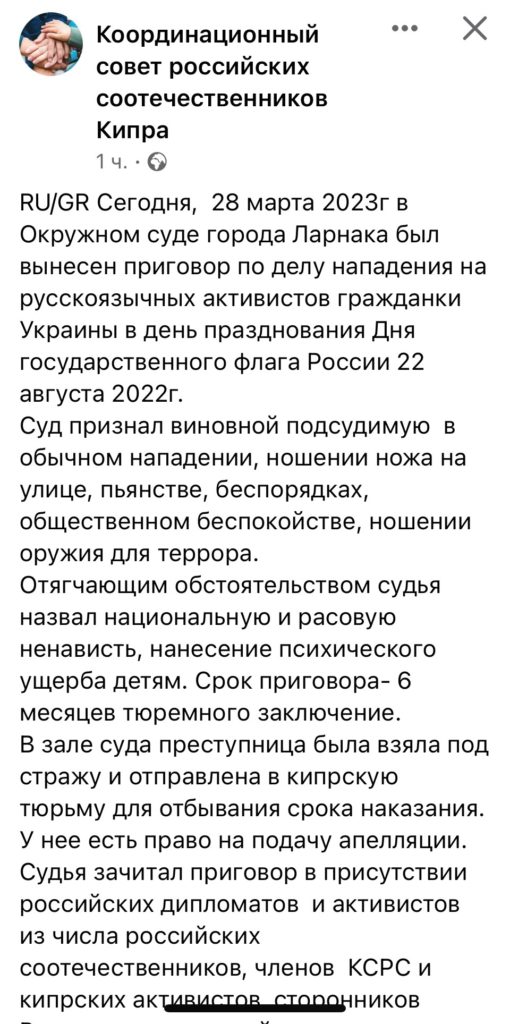
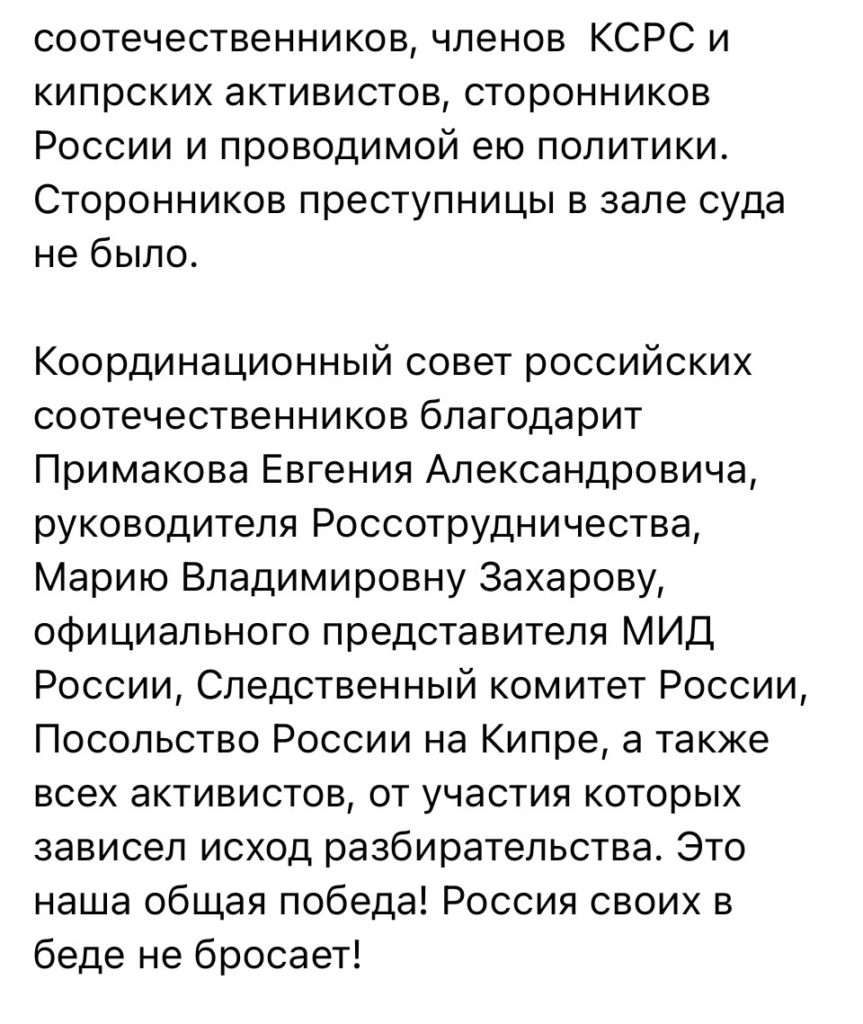

Ruscists near the court building of an EU member state
In other words, the “outcome of the trail” did not depend on the judge of the Larnaca District Court Andreas Louca, not on the current legislation of the Republic of Cyprus, not on the investigation conducted by the police, not on judicial practice, not on the testimony of witnesses, not on the video presented to the court, where the whole incident is clearly visible and which completely refutes the version of the following people:
1) Yevgeny Alexandrovich Primakov, head of Rossotrudnichestvo, which is under EU sanctions “for managing the company directly responsible for the implementation of policies that undermine the territorial integrity, sovereignty, and independence of Ukraine”, and add on our own, for affiliation with the special services of a terrorist state and carrying out war crimes in Ukraine.
2) Maria Vladimirovna Zakharova, official representative of the Russian Foreign Ministry, who is under the sanctions of the entire civilized world “as a central figure of the government propaganda that promoted the deployment of Russian forces in Ukraine and for supporting actions and policies that undermine the territorial integrity, sovereignty, and independence of Ukraine.”
3) The Investigative Committee of Russia, whose leadership, like the committee itself, is under sanctions for “serious violations of human rights in Russia, including arbitrary arrests and detentions.” It seems incredible, but it was the chairman of the Investigative Committee of Russia, Alexander Bastrykin, who instructed to open a criminal case in connection with an attack on Russians in the Republic of Cyprus.
4) The Russian Embassy in Cyprus, which, in its statement to the Russian media, sincerely admitted that it was putting pressure on the police and the courts of Cyprus: “Our diplomats and representatives of the consular service are in direct contact with the law enforcement agencies of Cyprus.”
5) Pro-Russian activists supported by the Russian special services, who regularly, on the embassy’s curators’ order, came to court hearings and picketed the courthouse.
Let us remind that the incident occurred on the territory of the Republic of Cyprus, in the EU member state, where the jurisdiction of the Investigative Committee of Russia does not apply. But Bastrykin does not think so. Maybe he has a reason for this? By the way, the Cypriot authorities did not consider this interference in the internal affairs of their country and did not protest about this. Apparently, the authorities of the island do not consider such actions of the Russians as something extraordinary. This is not Orwell’s “1984” novel, this is worse.
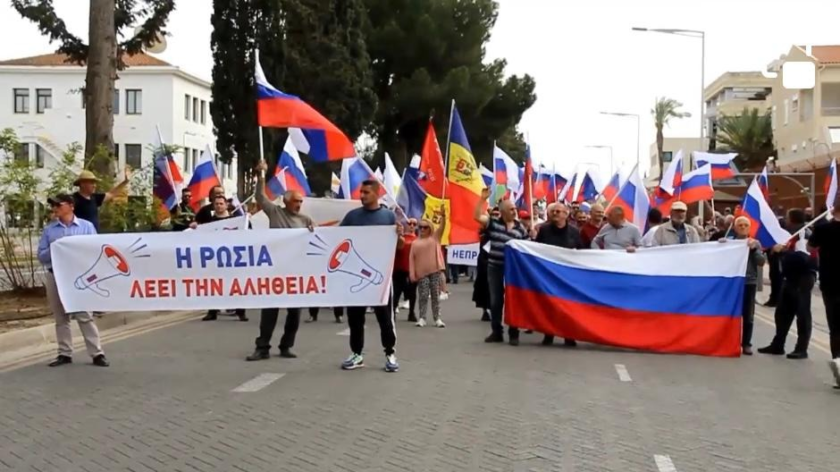
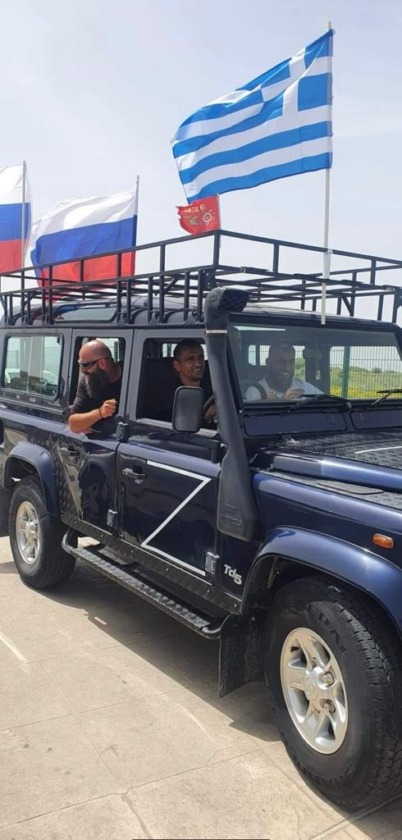
Since the beginning of the large-scale invasion of Russian troops in Ukraine and to this day, actions in support of Russia and the war against Ukraine have been regularly and often held in Cyprus. These actions take place with the connivance of the Cypriot authorities. They are organized and carried out by agents of influence of the Russian special services in Cyprus with the participation of a large number of Russian-speaking residents of the island who support Russia’s criminal war against Ukraine and a war criminal Putin. According to some sources, these are 10% of the country’s population.
The formal organizer of these actions is the already mentioned Coordinating Council of Russian Compatriots in Cyprus (KSORS), which is closely connected with the Russian special services and the Russian foreign intelligence unit, Rossotrudnichestvo, which is under EU sanctions. However, it did not affect the work of its Cypriot branch in any way.
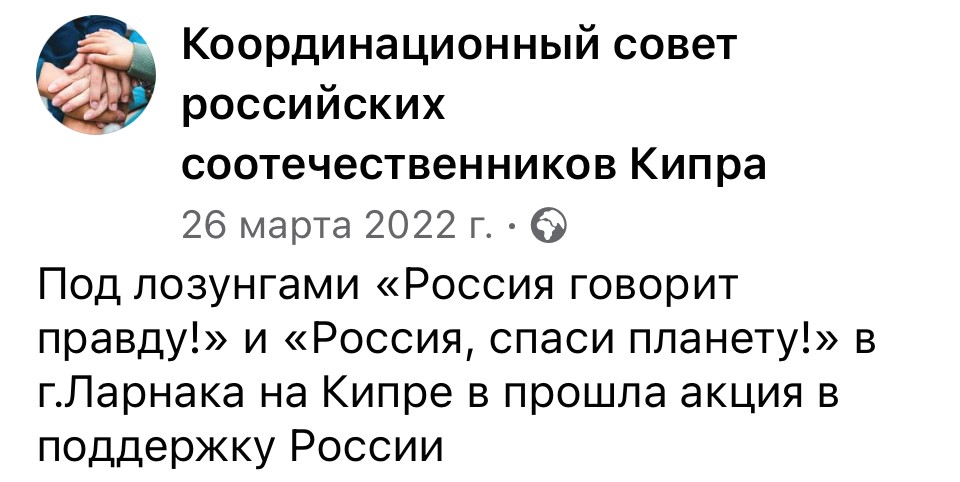
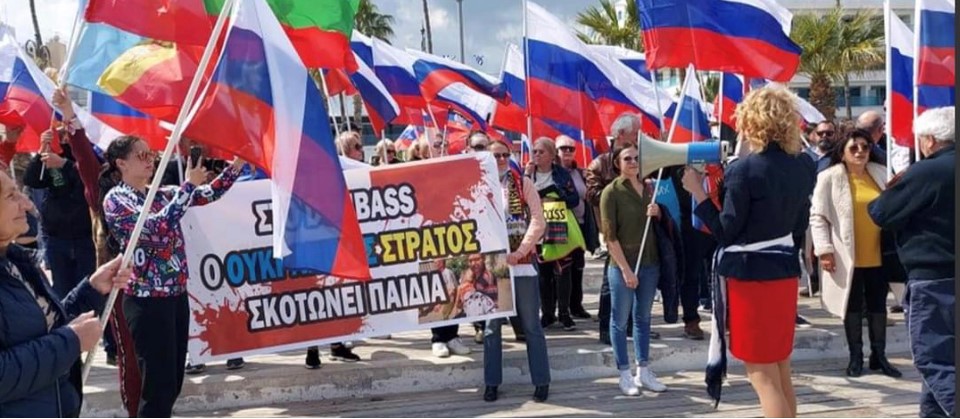
The course of events:
On June 12, 2022, the KSORS organized another massive pro-Russian propaganda action in Cyprus — the celebration of the Russian flag day.
One of the city parking in Larnaca, next to the house where Irina Krivous lives, was chosen as a gathering place for pro-Russian activists and their curators.
Irina Krivous, a citizen of Ukraine, has been living in Cyprus for many years. Since the beginning of the invasion of the Russian army into Ukraine, Irina has received daily reports of the injury and death of her friends and relatives, the destruction of houses and the entire cities in which her relatives and friends lived, the innumerable bloody crimes of the Russian army in her homeland, the suffering of people who have become refugees and disabled through the fault of Russia.
A month before the events described, Irina lost her brother. He died defending his country, his people, his family from the barbarian Moscow horde that invaded Ukraine.
Irina loved her brother very much, and suffers from the loss of a loved one.
Irina was shocked, seeing people with symbols of Russian fascism and militarism, Russian flags and posters in their hand praising and supporting Russia’s war crimes in Ukraine. As she would later say, “I couldn’t believe! These people supported the war and the massacres of innocent people.”
The cynicism of these people, who openly support the atrocities of the Russian invaders in Ukraine, angered Irina, and she ran out of the house to shame them and call upon the conscience.
At the same time, she forgot to leave the knife she used in the kitchen at that moment at home.
“I wanted to stop what was happening, I wanted to ask them a question, how they are not ashamed now, when Russia attacked Ukraine, now, when Russia is robbing, raping and killing Ukrainians, to support this horror. How can war and violence be supported? How can this regime be supported? All pro-Russian rallies are a mockery of the innocent victims of Russian aggression, of Ukrainians. This is a spit in the face of the entire civilized world, this is immoral! It’s absurd, after all!”
“My brother was killed by the same sadists, with the same flags, as those who gathered at the pro-Russian rally.”
From Irina’s house to the parking is about fifty meters. Irina was unable to restrain her emotions and from afar began to shout to the protesters to stop their coven and disperse. She was immediately noticed by the police.
Accoording to the court testimony of a police witness:
“I was there [at a russhist rally]. I saw 15-20 people [in the parking]. At 07.25 pm, I saw a woman walking towards the crowd. She held a knife in her hand. I immediately got out of the car and ran to her. She continued to brandish the knife and walk towards the protesters. She was screaming and saying something in a language I did not understand.
I ran up to her before she could approach the crowd and hurt anyone, took the knife from her and immediately arrested her at 07.27 pm.
It lasted two minutes.
The testimony of the policeman gives a clear picture of what happened. Obviously, Irina did not approach any of the participants in the pro-Russian rally.
His words are confirmed by a video made and published by one of the participants of the pro-Russian rally. This video clearly shows that Irina was detained by the police at a distance of about 15-20 meters from the ruscists. She didn’t approached anyone, and even more so, harmed anyone.
According to lawyer Mouskos, the testimony of the policeman in court was more than enough to drop the case. But events developed differently.
Irina was arrested, taken to the police station and later placed under arrest for a day. The police, for some reason, did not interrogate Irina. Lawyer Mouskos believes that this was done as a result of the low professional level of the police officers on duty that evening. We believe that this was done intentionally. The reason for this is the testimony in court of a policewoman who put Irina Krivous under arrest at the police station. When asked by the lawyer why the detainee was not interrogated, she replied, “because I received instructions.” The officer refused to say who gave instructions.
At the same time, the police recorded the testimony of the ruscists who declared themselves victims, completely distorting the picture of what happened.
According to them, Irina attacked them with a knife, chased after them and threatened to kill them. One of the most active ruscists in Cyprus, Lyudmila Chuikova, made an absolutely false statement that Irina allegedly grabbed her by the hair, put a knife to her throat and said that she would kill her. Police witness testimony and video of the incident completely refute Chuikova’s lie. Looking ahead, let’s say that despite the fact that it was a total lie, it was Chuikova’s lie that became the foundation of judge Andreas Louca’s verdict in Irina Krivous’ case, ignoring the testimony of a police witness and video from the scene.
The Russian government and state propaganda immediately used this opportunity to increase the degree of hatred towards Ukrainians. They made a fuss in the Russian propaganda disinformation media, accusing Irina of terrorism and Russophobia.
“NICOSIA, 23 August. /TASS/. On Monday, the authorities of the Republic of Cyprus detained a woman from Ukraine who attacked Lyudmila Chuikova, one of the leading activists of the Coordinating Council of Russian Compatriots of Cyprus (KSORS), and a group of Russians who were next to her. The KSORS informed TASS reporter on Tuesday.
The Russian authorities used this case as proof of the correctness of their propaganda portraying Ukrainians as bloodthirsty Nazis, fascists, and terrorists who inexplicably hate innocent Russians. All the main Russian state-owned media, using the incident in Larnaca’s parking, joined in the process of whipping up hysteria and stirring up hatred towards Ukrainians.
Before the start of the trial, Irina Krivous was charged with seven counts:
(1,2) attack on two persons
(3) carrying a knife outside the home
(4) drunkenness
(5) breach of the peace
(6) disorderly conduct
(7) carrying weapons for incitement to terror.
Irina’s guilt on these points was evident, so she and her lawyer decided to admit to these charges and end the trial there. The allegations were not serious and did not provide for serious punishments.
On September 19, on the first day of court hearings, by the Prosecutor General’s decision, the prosecutor’s office added three more charges to the already seven existent:
(8) incitement to violence and hatred
(9) racism
(10) xenophobia
Irina denied these accusations, which marked the beginning of a six-month trial.
The unexpected and unmotivated decision of the General Prosecutor’s Office of Cyprus was a signal that there is someone who is interested in aggravating the sentence of Irina Krivous by unjustified additional charges.
From the first day of the hearings, the Russian authorities openly put pressure on the court.
All court hearings were attended by people from the Russian embassy.
Before entering the court building, each time, a group of 10-15 KSORS activists gathered with posters.
There were posters with demands to trial Irina on terrorism charges and Putin’s propaganda slogans, as well.
The following persons have been seen among the participants of the picket:
Dmitry Vladimirovich Apraksin — Chairman of the KSORS, a citizen of Russia and Cyprus, a professor at the University of Nicosia, a propagandist of the “Russian world”, an admirer of a war criminal Putin, an agent of the Russian special services in the Republic of Cyprus.
Nemsida Pankratovna Krupennikova (Kroupenidou) is a member of the KSORS, a native of the Georgian city of Gardabani, a citizen of Russia and Greece, a tourist guide, a representative of the Pontic Greek community in the KSORS, a paid propagandist of the “Russian world” in the Republic of Cyprus.
Lyudmila Chuikova “Vikelena” is an activist of the KSORS, a citizen of Russia and Cyprus, the daughter of Soviet diplomats, a paid propagandist for the “Russian world”. She underwent treatment for alcoholism several times.
Dmitry Radjabov is an activist of the KSORS, a citizen of Russia and Greece, a propagandist of the “Russian world”, an admirer of Putin, a war criminal, has a criminal records, caught in sending threatening letters to Ukrainian refugees (for some reason, the Cypriot police do not notice this), suffers from drug addiction.
Mikis Filaniotis is a member of the KSORS, a full-time propagandist of the “Russian world” supported by the Kremlin, a citizen of Cyprus and Russia, a member of the Communist Party, studied in the USSR, a recruited agent of the Russian special services.
Mila Sharapova is a member of the KSORS, a citizen of Russia, a propagandist of the “Russian world”, an admirer of a war criminal Putin.
Tatyana Rodenkova is an activist of the KSORS, a citizen of Russia, a propagandist of the “Russian world”, an admirer of a war criminal Putin, and about two dozen less distinguished ruscists.
Alexander Stanislavovich Kulik was the organizer and coordinator of this KGB “gathering”. Formally, he is the director of the Russian school at the Russian embassy in Nicosia. According to our information, the FSB Fifth Service officer, engaged in espionage on the territory of the Republic of Cyprus.
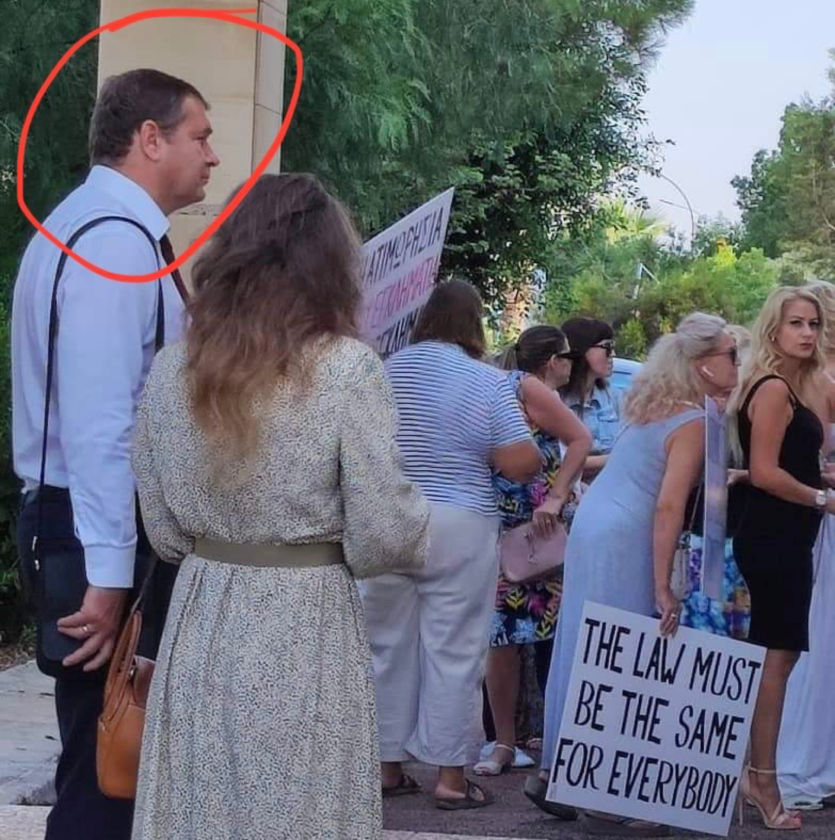
Alexander Kulik
Before each court hearings, this “school director” with the face of a major of state security, gave out commands to the crowd — where to stand, how to stand, what posters to hold, what feelings to feign. In full accordance with the KGB textbooks on active measures.
The KSORS leaders and activists obeyed him without questions and carried out his orders soldierly, quickly and clearly. Apparently, this is the experience of conducting numerous mass propaganda events, led by curators from the embassy.
But, obviously, the government of Cyprus was the main object of pressure, and this was done behind the scenes. It is unlikely that Zakharova, Primakov, Bastrykin and Zyazikov called judge Louca and explained to him what sentence he should pass. They were talking to people from higher ranks in government circles. We know that this issue was discussed at one of the FSB general’s meeting, working under cover of the Russian ambassador, Zyazikov, with the General Secretary of the Communist Party of Cyprus Stefanos Stephanou.
As a result, all witnesses and policemen in their testimonies gave identical evidence of what had happened there – Irina Krivous was detained at a great distance from the protesters and did not cause them any harm. There was no doubt that they were telling the truth. Their version is confirmed by a video from the scene.
The “victims”, on the contrary, lied, got confused in their testimony, changed it, gave contradictory accounts, contradicted each other, told stories obviously invented by someone and poorly memorized. Their lies, fictions, uncertainty, inconsistency were visible to everyone, except, perhaps, the judge. The court regarded their testimony credible.
Ludmila Chuikova, appointed by the Russian Embassy as the main victim, a supporter of war and massacres, kept strong eye contact with the Russian diplomat who was in the court room and answered questions according to the nods and shakes of his head.
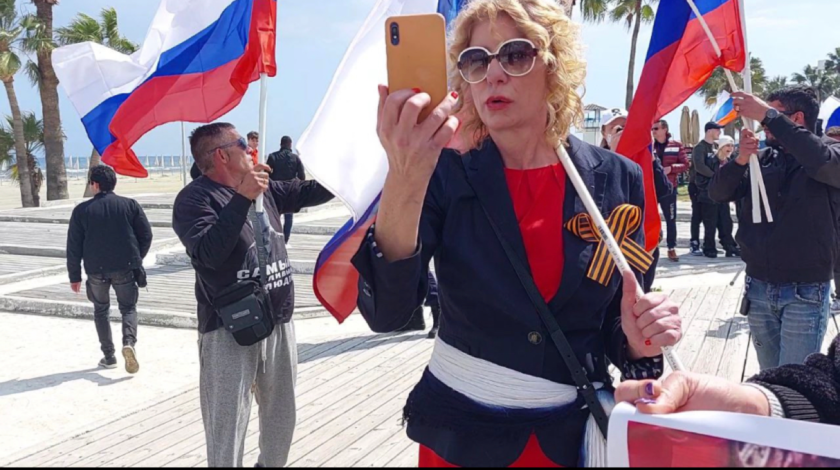
Ludmila Chuikova
According to the witnesses of this parody of justice, it looked outrageous. They could not understand how the judge could endure this circus and why he did not interrupt the session and acquit Irina Krivous in view of the obviously false testimonies of the “victims” and obvious manipulations from the audience.
The most severe sentence of judge Andreas Louca provides an answer to this question.
Before sentencing, Irina’s lawyer was confident that the sentence would be lenient and that she would receive a minor penalty in the form of a fine. He had every reason to think so, because the whole course of the trial served as confirmation of this. There could be no other result. Witnesses unequivocally testified that Irina was not guilty of the additional counts. The “victims” with their lies and confusing testimonies only strengthened the position of the defense.
On March 28, Irina and her lawyer came to court, confident that Irina would be fined and sent home. But, judge Andreas Louca stood up and delivered the verdict with a steely voice — six months in prison.
Having heard the verdict, Irina’s lawyer was at a loss of words for several minutes and froze up. Judge Louke’s verdict came as a shock to him.
He could not understand what had happened to the judge. What made him not hear the witnesses, not see the video evidence and make a deliberately unlawful, unfair decision.
All Giorgos Mouskos’ experience, his knowledge, education, judicial practice, the course of the trial, the reputation of judge Louca, common sense, a sense of humanism, compassion and elementary justice categorically indicated that his client faces a small fine. The entire course of the trial was proof of that.
Irina’s lawyer was amazed and stunned that he did not know and did not understand a simple thing — where there is Russian influence, everything is possible that is contrary to law, justice and common sense.
The Russian authorities have put a lot of effort into making anti-Ukrainian hysteria out of this story. The severe punishment of Irina with the necessary wording in the verdict was supposed to be Russia’s propaganda success in the information war against Ukraine and the West. The extreme interest of the Russian authorities only in such an outcome of the case is more than obvious, which means that in order to achieve the desired result, the Russian authorities could well use their favorite methods of influence with the help of their special services.
The range of measures taken against judge Andreas Louca by the Russian secret services could be very wide – from intimidation and blackmail to banal bribery. There is no direct evidence for this, but there are reasons for such suspicions.
Recall that in order to achieve the goals set by the political leadership of the country, the Russian special services use different ways and methods — from urine substituting of Russian athletes and poisoning Litvinenko with a radioactive substance in central London, to bribing European officials and hacker attacks on government agencies of other countries.
There is no doubt that judge Andreas Louca wrote the verdict against Irina Krivous taking into account the interests, and possibly direct instructions, of Moscow.
The editors have at their disposal a copy of the verdict of the Larnaca District Court in the case of Irina Krivous.
It says that Irina Krivous admitted that she was intoxicated that evening. Russian propaganda used this fact to ruin Irina’s reputation and presented it as evidence of her guilt. In fact, Irina incriminated herself before the court on her lawyer’s advice. According to the norms of English common law principles in force in Cyprus, being intoxicated during the commission of such offenses is a mitigating circumstance.
There is no reference to the police officer’s testimony in the verdict.
But there are numerous references to the testimony of the “victims” accepted by the court as evidence to prove guilt.
The court recognized as a proven fact Chuikova’s obvious lie that Irina allegedly grabbed her by the hair and put a knife to her throat.
Trying to legitimize and justify his decision, judge Andreas Louca refers to court decisions in other cases as precedent cases. However, close examination of these cases makes it clear that judge Louca is trying to mislead the other participants of the case, since the examples he cited have nothing in common with the case of Irina Krivous. It once again proves that judge Andreas Louca’s verdict in relation to Irina Krivous has nothing to do with justice and fairness.
The Russian authorities and Russian propaganda have made every effort to prevent a fair decision of the court. They did everything possible to inflate anti-Ukrainian hysteria from this story to the whole world. The case of Irina Krivous is being exploited in Russia as proof of the insane narratives of Putin’s propaganda. The verdict is being used as a tool to intimidate anti-Russian activists and a symbol of the victory of pro-Russian forces in Europe. It is no coincidence that immediately after the end of the trial, FSB General Murad Zyazikov, acting in the Republic of Cyprus under diplomatic cover, thanked all the participants in the special operation for a job well done.
The Russian authorities needed just such a verdict. They got it.
The pervasive influence of Russia in Cyprus is well known. A huge flow of uncontrolled Russian money brought Russian corruption to the island and, along with it, Russian influence. Vast wealth of Russian officials, intelligence officers, bandits, and businessmen linked to Putin’s regime are hidden in Cyprus. The maintenance of these assets serves as a source of enrichment for many members of the Cypriot political and business elite. Many Russian oligarchs are served by law firms and accounting firms owned by current Cypriot government officials and MPs.
Against this background, the judiciary of Cyprus, until now, looked like a bastion of honesty and incorruptibility amid the general criminal Russification of the island. The Larnaca District Court judge Andreas Louca’s verdict in the case of Irina Krivous made it clear that under the onslaught of Russian all-destroying influence, this bastion fell.
The case of Irina Krivous is a signal that Russia has managed to take another step towards the final transformation of the Republic of Cyprus into its Trojan Horse in the European Union.
Despite the verdict of the court, we do not leave hope for a conscientious investigation and a fair verdict in the case of Irina Krivous. I would like to believe that the facts presented will help to clarify all the circumstances of the incident and restore justice. Perhaps this can be done with the help of the EU authorities.
Editorial

